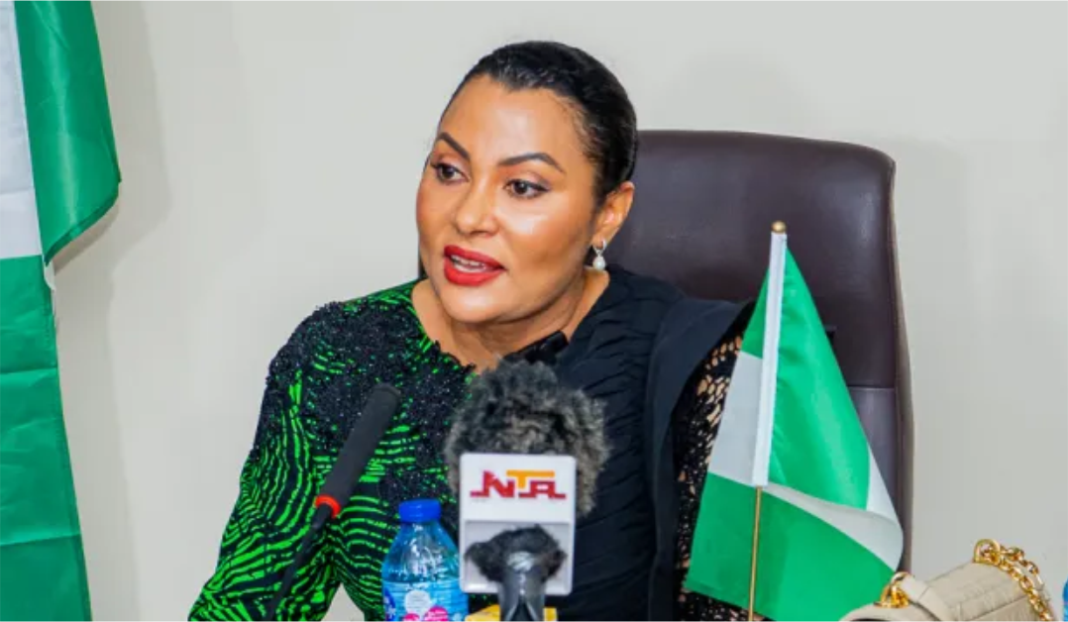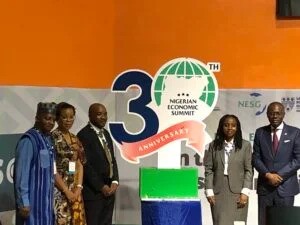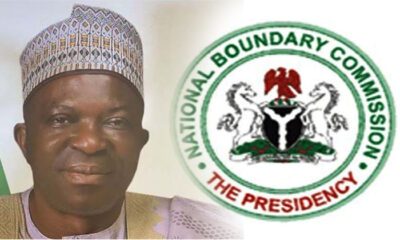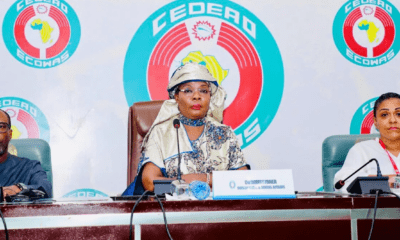News
Pressure tightens on Nigeria’s foreign trade as Mali, Niger, Burkina Faso exit ECOWAS
…Nigerians risk a further hike in price of rice, oil, millet, others
By Moses Adeniyi
Nigeria’s foreign trade value may further suffer within the West African region particularly, with Burkina Faso, Mali, and Niger, as the three military regimes of the nations announced their immediate withdrawal from the Economic Community of West African States (ECOWAS).
The decision may further worsen Nigeria’s network of trade to other connecting nations with a worsening of trade relations with the three.
The leaders of the three Sahel nations on Sunday issued a statement saying it was a “sovereign decision” to leave the ECOWAS “without delay.”
Struggling with jihadist violence and poverty, the regimes have had tense ties with ECOWAS since coups took place in Niger last July, Burkina Faso in 2022 and Mali in 2020.
All three were suspended from ECOWAS, with Niger and Mali facing heavy sanctions.
They have hardened their positions in recent months and joined forces in an “Alliance of Sahel States.”
A French military withdrawal from the Sahel — the region along the Sahara desert across Africa — has heightened concerns over the conflicts spreading southward to the Gulf of Guinea states Ghana, Togo, Benin, and Ivory Coast.
The Prime minister appointed by Niger’s military regime on Thursday blasted ECOWAS for “bad faith” after the bloc largely shunned a planned meeting in Niamey.
Niger had hoped for an opportunity to talk through differences with fellow states of ECOWAS, which has cold-shouldered Niamey, imposing heavy economic and financial sanctions following the military coup that overthrew elected president Mohamed Bazoum.
The ECOWAS had previously slammed sanctions on Niger and ordered its standby force to restore constitutional order in the West African nation; a move that had been widely rejected, especially in Nigeria.
The Nigerian government had on August 4th, 2023 closed all its land borders with Niger as part of sanctions against the country over the military coup that took place on July 26.
Since the border closure enforced against Niger Republic following the country’s junta’s refusal to restore ousted President Muhammed Bazoum to office, prices of food items, such as rice, millet, oil and other food staples that come into Nigeria through Niger border have recorded a hike in prices.
Other commodities as clothes and beverages have equally recorded a soaring hike, a development that Nigerian border communities have lamented.
Border communities such as Illela Local Government Area of Sokoto State, which shares border with Konni Local Government Area in Taohoua State of Niger Republic, Jibia in Katsina State, Yunusari Local Government Area of Yobe State, among others, have lamented hike in price of rice from N30,000 per 50kg bag, to above N50,000 since the border closure, even as other food staples most of which were from Niger have recorded similar hike.
Also, Nigerian traders have lamented the plummeting of trade transactions as export of Nigerian made products, such as flour, cement, agricultural products, both perishable and non-perishable, house furniture, building materials, to Niger which is a strategic route to Mali, Mauritania, and other trade partners with Nigeria, have suffered.
Late last year, Nigerian traders under the platform of Arewa Economic Forum had lamented that its members lost about N13 billion weekly to closure of the borders with Niger.
They had called on the Federal Government to avoid punishing innocent Nigerians in a bid to sanction the military junta in Niger.
Seven northern Nigeria states, including Kebbi, Sokoto, Zamfara, Katsina Jigawa, Yobe and Borno share a 1,608 kilometres long border with five regions in the Niger Republic.
Chairman of Arewa Economic Forum, Alhaji Ibrahim Danda-Kate, had said Nigerian authorities should be mindful of the impact any closure of the border with Niger will create for Nigeria and other neighbouring nations.
He had noted Niger is a trade route to Mauritania, Mali and other trade partners with Nigeria.
Danda-Kate also said, “the financial loss is about N13bn per week. Any disruption in the lives of those people will have a devastating effect on Nigeria and the rate of refugees more than what Nigeria currently has. We are not prepared enough to take in more refugees from Niger.”
With the pulling out of Mali, Niger, Burkina Faso from ECOWAS, Nigeria’s trade within the West African region is bound to suffer as Nigerians risk a soaring hike in prices of food items and commodities.
News
Application deadline for management of Nigeria’s $10bn Diaspora Fund extended


The Nigerian federal government has shifted the application deadline for companies interested in managing the $10 billion Diaspora Fund.
Minister of the Federal Ministry of Industry, Trade and Investment, Doris Uzoka-Anite, disclosed this in a circular on Thursday in Abuja.
Accordingly, the deadline for May 6 has been shifted to May 13, 2024.
The minister urged prospective applicants to utilise the extra time to complete their submissions, ensuring they are thorough and competitive.
She stressed that the extension is designed to allow stakeholders additional time to adequately prepare their applications following the guidelines established for the fund.
“The Federal Ministry of Industry, Trade, and Investment wishes to inform all interested parties that the deadline for the submission of Expressions of Interest (EOI) for the Nigeria Diaspora Fund has been extended.
“The new submission deadline is May 13, 2024. This extension is intended to accommodate stakeholders who require more time to prepare their applications by the guidelines provided for the $10 billion Nigeria Diaspora Fund,” she stated.
News
Sanwo-Olu, NESG harp on PPP for economic growth


Gov. Babajide Sanwo-Olu of Lagos State has emphasised the role of public-private sector partnerships in driving accelerated sustainable economic growth in Nigeria.
He made the remark at the Nigerian Economic Summit Group (NESG) Public Lecture and Founders’ Forum held at the Lagos Business School on Thursday.
The event, which marked the official launch of the 30th anniversary of the Nigerian Economic Summit (NES) has the theme: “In the National Interest: Reflecting on the Past, Reimagining the Future.”
Sanwo-Olu said it was imperative that the public sector improved on its synergy with various actors pursuing a collective agenda of service for the citizens.
The governor highlighted the significant role the NESG plays in bringing together public and private sector leaders in the country in an ongoing dialogue to shape, influence and create a thriving competitive and successful economy.
“We’re not where we should be and we must continue to set goals to inspire ourselves to do better as a nation
“We may not always achieve our targets for our vision timelines, but that should not be an excuse for not trying,” he said.
He commended the NESG for its various interventions such as the flagship annual summit, roundtable and sectorial policy commissions, technical support work and policy innovation centre.
He, however, urged NESG to explore ways of deepening linkage between policy work and public consciousness that allows engagement with the citizenry.
Delivering the lecture, Mrs Ifueko Omoigui-Okauru, Managing Partner, Compliance Professionals PLC, said that while there had been significant economic changes, more needed to be done to ensure accelerated economic growth.
Omoigui-Okauru said that there was need to build inclusive policies that reflect the realities of the nation rather than imposing replicas of other countries.
“In 30 years, we may have made some progress, but we can’t say we have radically transformed Nigeria.
“As we reflect on the NESG, there’s still a lot to be done in bridging the rural-urban divide and have an inclusive agenda.
“We see our journey as work in progress. We need to determine the parameters that would drive our success and put policies in place to move us in the direction where we need to be.
“It is important for us to move away from self interest, think of ways to use technology and other frameworks to collectively achieve the Nigeria of our dreams,” she said.
Earlier in his opening remarks, Mr Niyi Yusuf, Chairman, NESG, said the 30th Summit reaffirmed the essentiality of public-private partnerships in tackling complex economic realities.
Yusuf, however, said that the journey to embracing market mechanisms has not been without its challenges.
He reiterated unwavering commitment in driving reforms through rigorous research, economic and social programmes, and inclusive summits, all aimed at shaping the socio-economic development of our nation.
“Thirty years ago, at a critical juncture in our nation’s history, the NES was born out of a necessity when the winds of economic challenges blew fiercely, necessitating a platform for robust public-private dialogue.
“Since our inaugural summit in 1993, the NES has been a progressive economic discourse rooted deeply in collaborative efforts between government leaders and private sector visionaries.
“Each Summit has crafted policies and strategies essential for removing barriers to competitiveness, growth, and inclusive development.
“Therefore, in commemorating this 30th anniversary, it is essential to assess and discuss the role of this public-private dialogue platform in Nigeria’s socio-economic landscape to provide us insights for future engagements,” he said.
The chairman assured collaborative efforts with the three arms of federal and subnational governments and private sector communities to propel Nigeria towards a more resilient, inclusive and prosperous future.
Dr Pascal Dozie, Chairman, NESG Advisory Board, listed political, economic, education and environment sectors as pathways to reimagining Nigeria’s future
Dozie, also pioneer Chairman of NESG Board of Directors, was represented by Mr Frank Aigbogun, Chief Executive Officer of BusinessDay.
He charged NESG to adopt new strategies in providing collaborative leadership in seeking answers to the following crucial questions.
“How do we strengthen democratic institutions and rule of law, foster culture of inclusiveness and representation?
“How do we promote transparency and accountability in governance and inculcate the culture of consequences for bad behaviour in every sphere of life?
“In economic reimagining, how do we diversify Nigeria’s economy, reduce dependence on oil, foster a business friendly environment and develop the much needed infrastructure base in a coordinated nationwide approach?
“How do we repurpose the educational system to focus on science, technology, engineering and mathematics, encourage technology entrepreneurship and innovation and address unemployment?
“For the environment, how can we develop sustainable agriculture and food security, promote sustainable practices, renewable energy and eco tourism?
“It is imperative that the NESG community leads from the front in not only providing actionable answers to these questions but also making sacrifices to ensure they are implemented,” he said.
Similarly, Chief Executive Officer of NESG, Dr Tayo Aduloju, said that strong institutions, political will, accountability by all stakeholders and the willingness for the government to allow private sector to drive growth were factors needed for a successful economic development.
“The challenge for us today is how to drive the country forward over the next 30 years in a way that is not just growth but growth that creates jobs and opportunities for everyone and no one is left behind.
“We are dealing with a country that is going through macro-economic volatility and instability.
“So, the lessons here at the forum are deep reflections of what should change in our approach, a stronger priority on execution, a deeper commitment on accountability of government systems to deliver and how economic barometers impact the ordinary man on the street.
“Our resilience to hold government accountable, to keep insisting that there must be an economy that works for all Nigerians, rule of law, an environment in which free enterprise is practiced, is what we must continue to fight for,” he added.
News
NCS FoU Zone ‘B’ Nabs Fake Customs Officer


-
capital market2 years ago
Rt.briscoe, FBNH, Others halts negative performance of stock market
-
Finance3 months ago
Court orders Sen. Victor Umeh to repay N136m bank debt to AMCON
-



 Abuja Update2 months ago
Abuja Update2 months agoUNDP, FG partnership needed to achieve inclusion, equity- Minister
-
Abuja Update1 month ago
Banks drive stock market performance with N147bn gain
-



 Business1 week ago
Business1 week agoTingo Group unveils Tingo Electric, Tingo Cola drink at Lagos launch
-



 Health2 weeks ago
Health2 weeks agoCapacity training will reduce migration of health workers- NPHCDA
-
News4 months ago
Oil thieves sponsoring malicious media campaign against Navy – Spokesman
-



 Infotech1 month ago
Infotech1 month agoWorld Backup Day: NITDA urges Nigerians to ensure backup of data
















